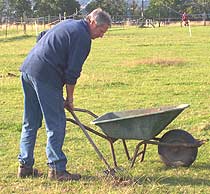
Worming Your Horse - Avoid Resistance to Equine Wormers
There is currently an overuse of horse wormers (anthelmintics) in the equine world.
Over 90% of worms that affect are in just 10% of the horse and pony population, and the unnecessary dosage of equine wormers on horses is now causing drug resistance.

There is already widespread cyathostome (redworm) resistance to the drug Fenbendazole.
Resistance to dosage with Pyrantel has been seen and now preliminary warning signs of equine resistance to doses of ivermectin and moxidectin are also now present.
At present there are no new horse worming products being developed by pharmaceutical companies.
This means that once there is resistance to the current horse wormng products that are available there will be no effective treatment for those horses that do have a worm burden.
USING FAECAL WORM EGG COUNTS (FWEC) TO CONTROL WORMS
To help to avoid resistance to horse wormers the ideal protocol, or worming program, is to do regular faecal worm egg counts [FWECJ - some horse owners refer to these as "worm counts".
A faecal sample taken from a horse is microscopically analysed for worm eggs and the number ofworm eggs present in the sample are recorded.
The horse is then dosed with a wormer based on this.
However most samples have nil to extremely low counts of egg numbers and worming the horse is not usually necessary.
Initially it is best to have a worm egg count done for each horse every 3 months.
Provided egg numbers remain low, then after the 1st year that interval between worm egg counts can be increased to once every four months.
There are advantages of taking regular worm counts. Your horse is less likely to build up a resitance to wormers, he is not given unecessary medicines and does not havethe stress of being given something he doesn't like.
WHEN TO TAKE SAMPLES FOR WORM COUNTS
Late May or June is normally the best time to start sampling, but do
consult your vet for their opinion.
If your horse has already been wormed in spring you may need to wait until
your next worming dose is two weeks overdue so that any adult worms present
have had time to produce some eggs.
DISADVANTAGES OF WORM COUNTS
A disadvantage of a having worm egg count is that it is not reliable for the analysis of tapeworm eggs in horses. Therefore it is recommended that a tapeworm wormer is included your horse or pony's worming regime, this can be done every six to twelve months.
Alternatively a blood sample may be taken from you horse or pony to assess if a horse or pony has tapeworms
MANAGEMENT OF HORSES AND PASTURE TO REDUCE WORM COUNTS
Alongside the worm egg count programme, it is important that other horse and pasture management practices are put in place:
- Regularly remove droppings from fields - at least twice weekly is best.
- Avoid overgrazing fields where horses are turned out
- Rest grazing from horses for 6 months at a time - the pasture can be rotated for grazing with sheep or cattle.
- Keep horses and ponies with a high worm egg count separate from those with a low worm egg count
- Turn out horses of a similar age together
- Harrow fields where horses are grazing in summer - this breaks up droppings and scatters the worm larvae.